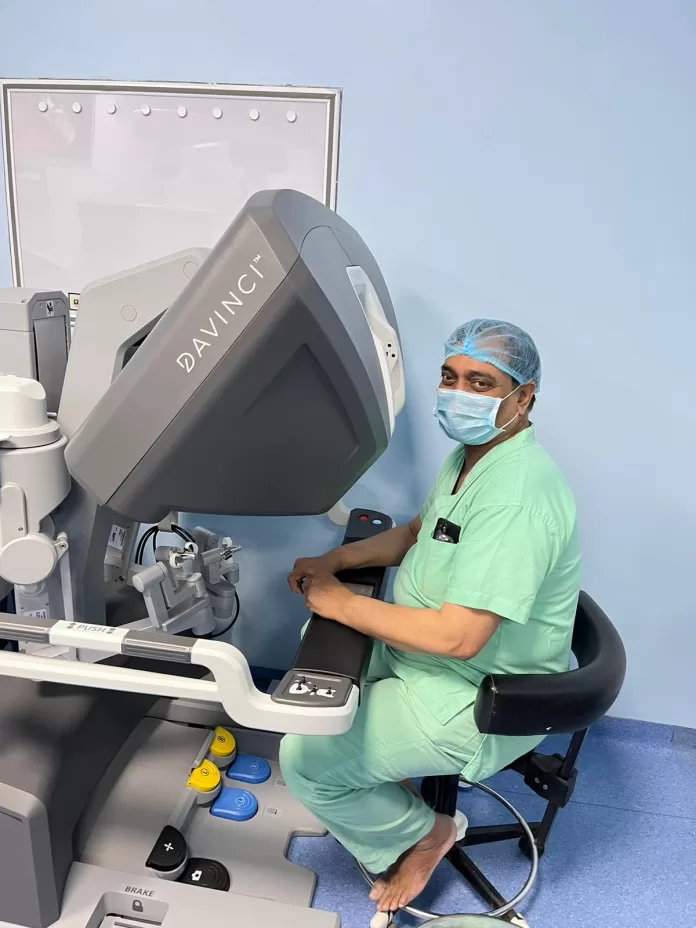Dr. Mukta Srinivasulu, Director of MNJ Hospital, Hyderabad, emphasized the significance of integrating advanced medical technologies, such as robotic-assisted surgery, into the curriculum for medical postgraduate students. He was addressing the media in Hyderabad today on the completion of 100 robotic-assisted surgeries by MNJ hospital.
MNJ Institute of Oncology is at the forefront of making advanced medical care universally accessible, irrespective of socio-economic status.
By offering robotic surgery at zero cost, MNJ Institute of Oncology eliminates the financial obstacles that often hinder individuals from accessing life-saving procedures.
This initiative ensures that everyone, regardless of their financial means, can benefit from state-of-the-art surgical interventions.
Committed to not compromising on the quality of care, the institute has chosen the da Vinci surgical system, renowned for its precision, minimally invasive approach, and faster recovery times.
Since its installation last September, the institute has successfully performed more than 100 robotic-assisted surgeries, demonstrating its dedication to providing the best technology available.
Commenting on this development, Dr. Mukta Srinivasulu said, “I am glad to mention that we have completed 100 successful robotic-surgeries, as a part of our efforts to tackle the rising tide of cancer cases in Telengana.
At MNJ Institute of Oncology & Regional Cancer Center, we’re dedicated to pushing the boundaries of what’s possible in cancer care. With robotic-assisted surgery, we’re taking a significant step forward in our mission to provide compassionate, cutting-edge treatment to every patient who walks through our doors.
We believe that every patient deserves access to state-of-the-art technology. With the da Vinci robotic-assisted surgery, we’re bringing the latest advancements in surgical precision and minimally invasive techniques to our facility.”
MNJ Institute of oncology is one of the first medical institutes in India to offer training in robotic-assisted surgery for PG students.
This initiative not only prepares future surgeons but also enhances patient access to cutting-edge surgical techniques, particularly benefiting the lesser privileged, ultimately improving the overall quality of healthcare in the country.
“Introducing robotic-assisted surgical technology into the medical curriculum for students could help support the next generation of India’s robotic surgeons, for those who choose that pathway,” Dr, Srinivasulu added.
With the inclusion of advanced surgical technologies like surgical robotics, MNJ Hospital is considered as one of the most preferred medical institutions for PG in India.
He further added that “While there are various factors influencing this preference, our commitment to embracing cutting-edge technology like the da Vinci robotic-assisted Surgery certainly adds value.
Students recognize the importance of staying ahead in the medical field, and our focus on innovation resonates with their aspirations.”
Commenting on their efforts to make this novel technology accessible to everyone, Ms. Darla Hutton, GM- India and VP Commercial Operations – APAC of Intuitive, the makers of da Vinci RAS technology, said, “At Intuitive, one of our goals is to make state-of-the-art technology accessible to everyone. We have been collaborating with government medical colleges to achieve this, and we are pleased to announce our collaboration with one of the leading cancer centers in Hyderabad, MNJ Institute of Oncology. We believe that government institutions like MNJ will continue to enhance the adoption of robotic-assisted surgery, making it more accessible to patients from all segments of society. It is also encouraging to see that MNJ is providing hands-on training on Robotic system to postgraduate students, which will help the healthcare ecosystem in nurturing more young robotic surgeons in India.”
Robotic-assisted surgery is a minimally invasive procedure that helps patients return to their everyday life much faster, in many surgical procedures. Surgeons use the da Vinci Surgical System to operate through a few small incisions.
The system includes a magnified 3D high-definition vision system and tiny wristed instruments that bend and rotate much more than the human hand. As a result, surgeons have better vision, precision, and control.
Other benefits include decreased pain, fewer post-operative wound infections, less post-operative scarring, and faster recovery. Reducing the chance of infection makes it an ideal procedure, especially for people with co-morbidities.














